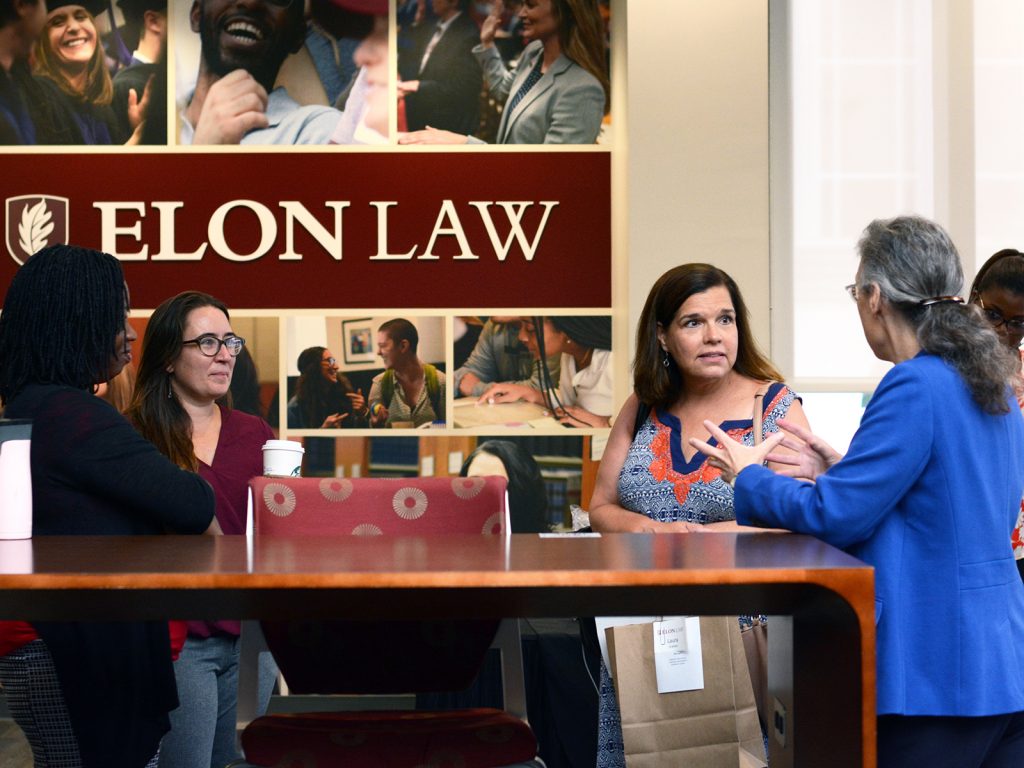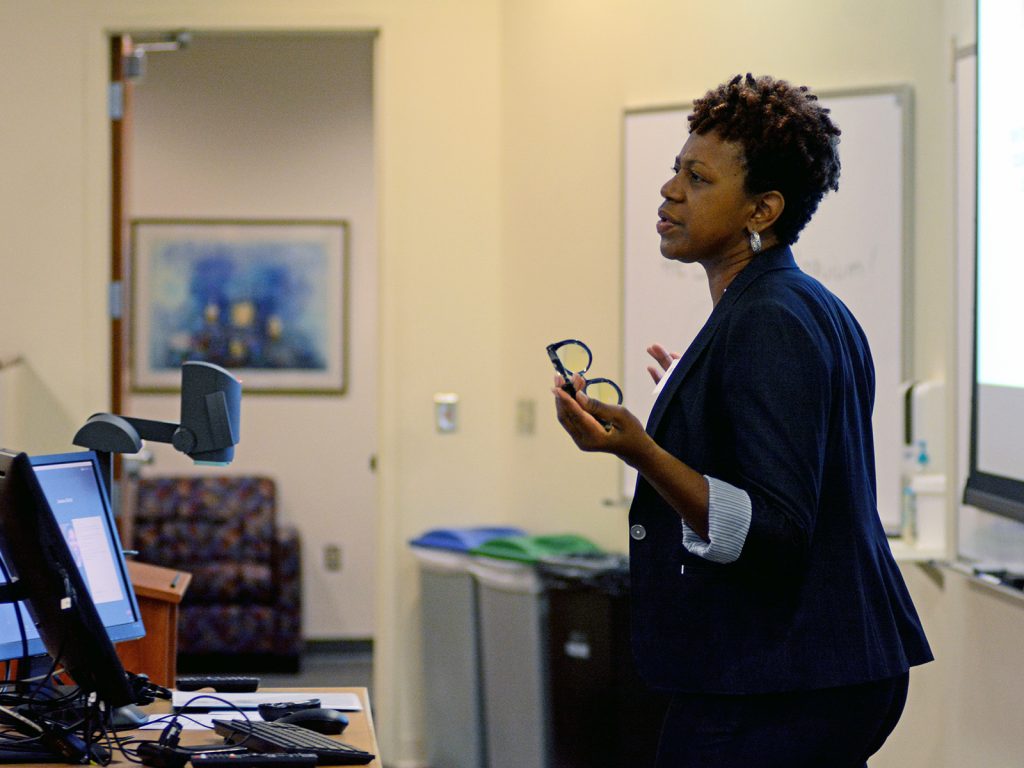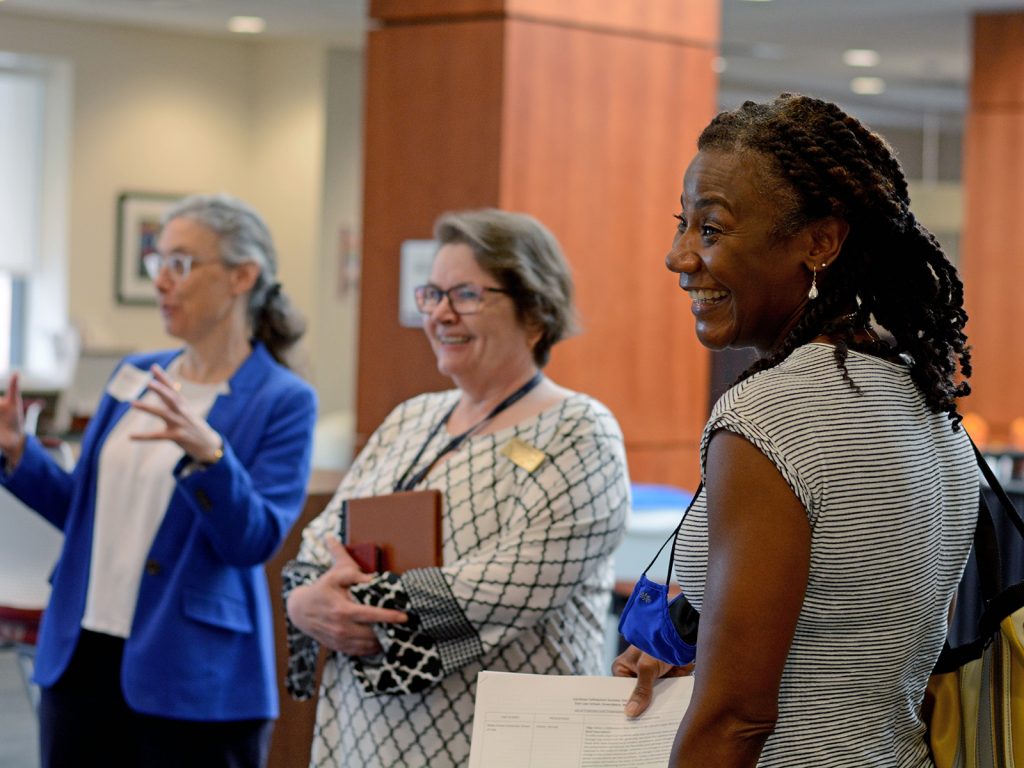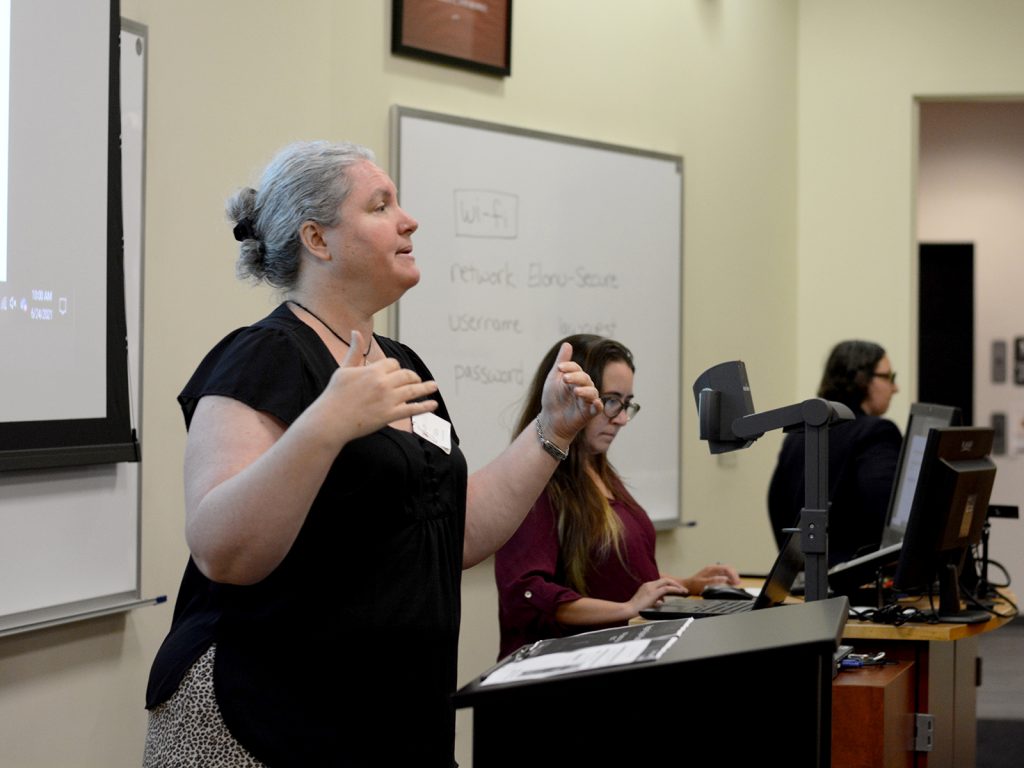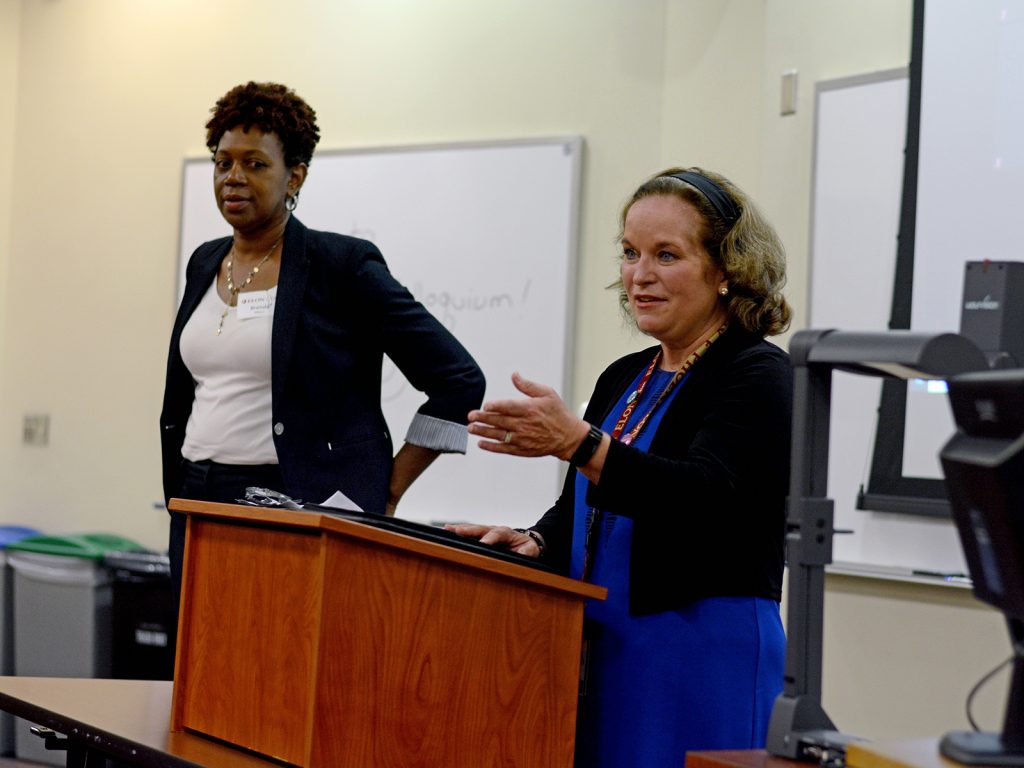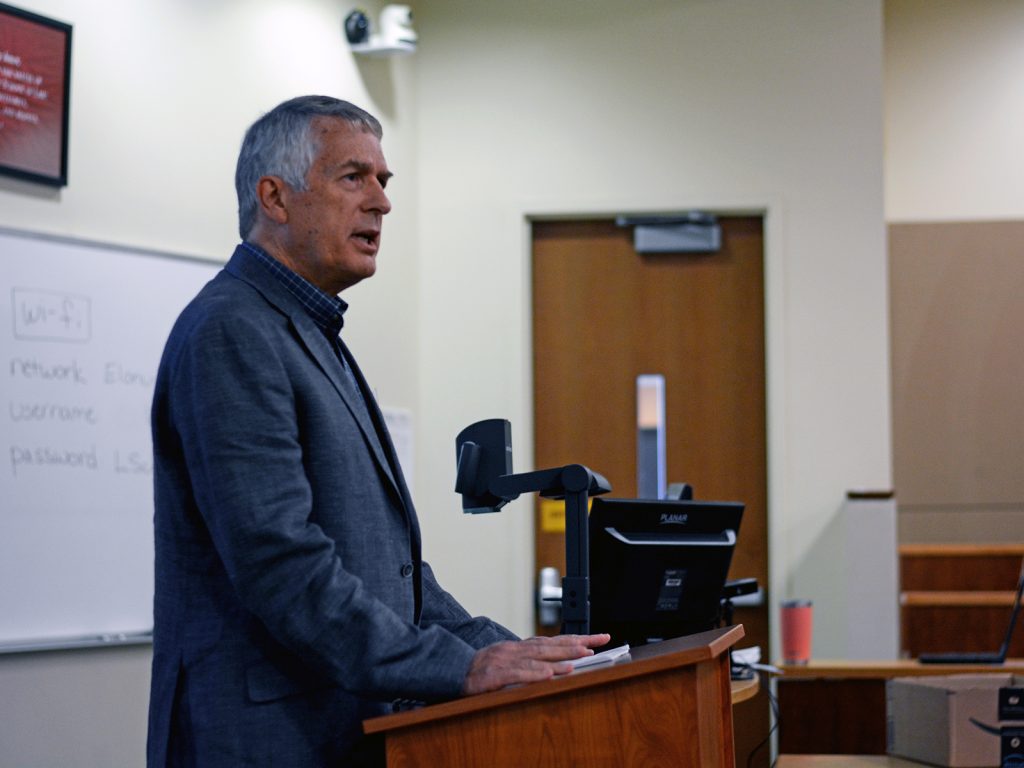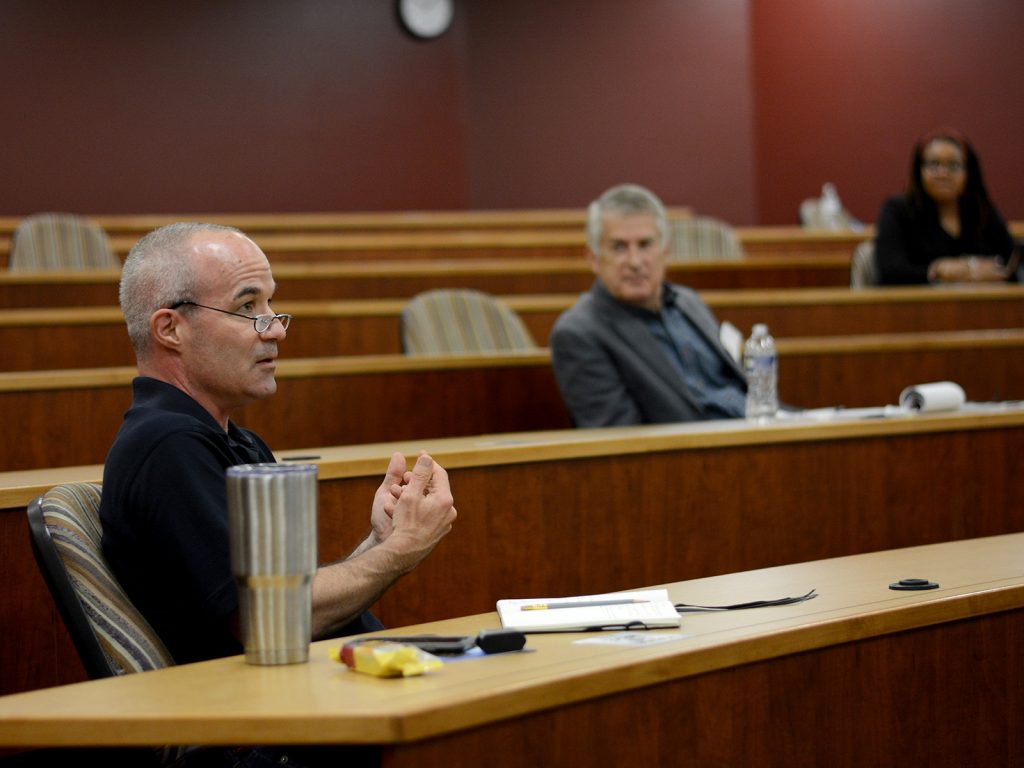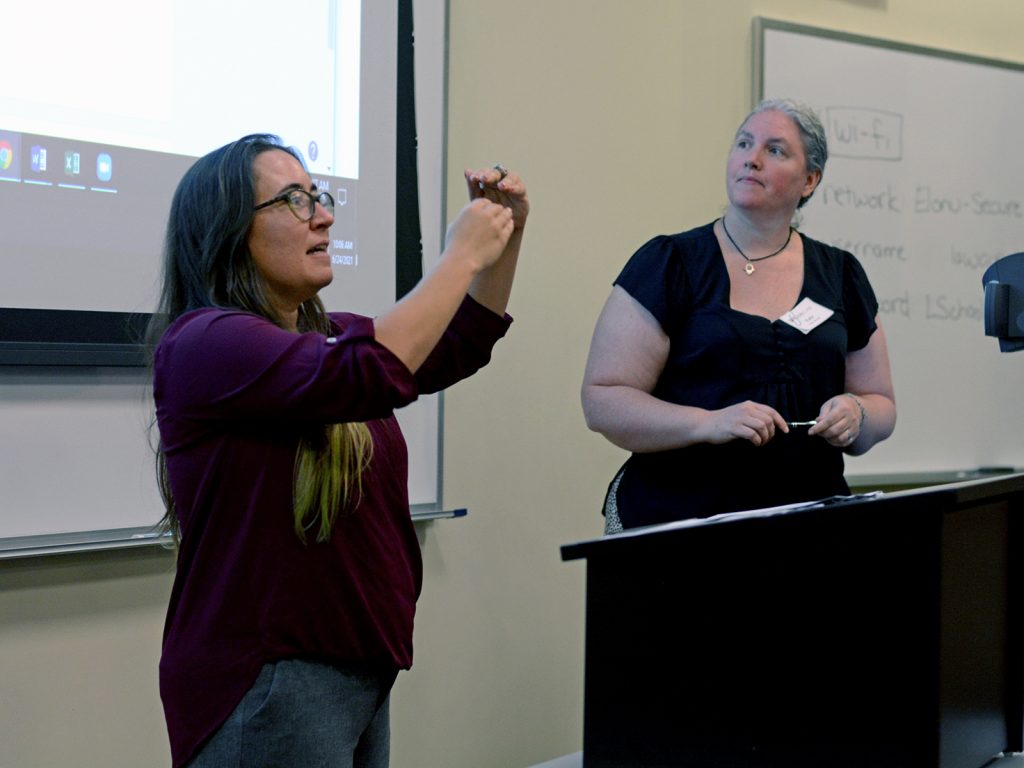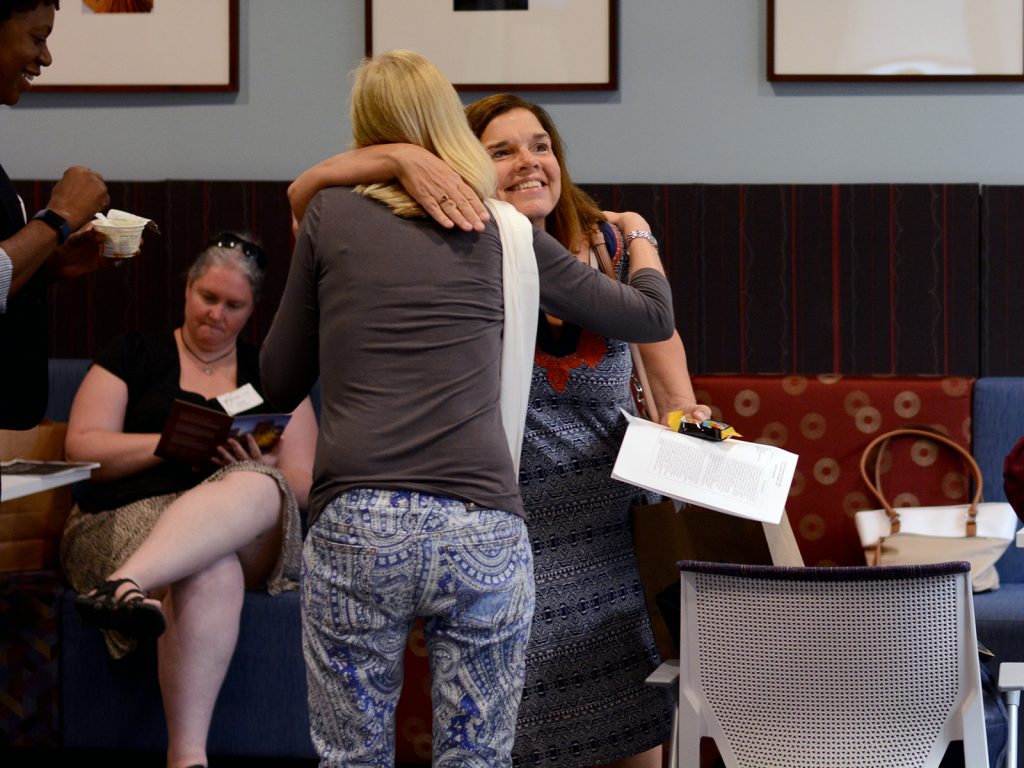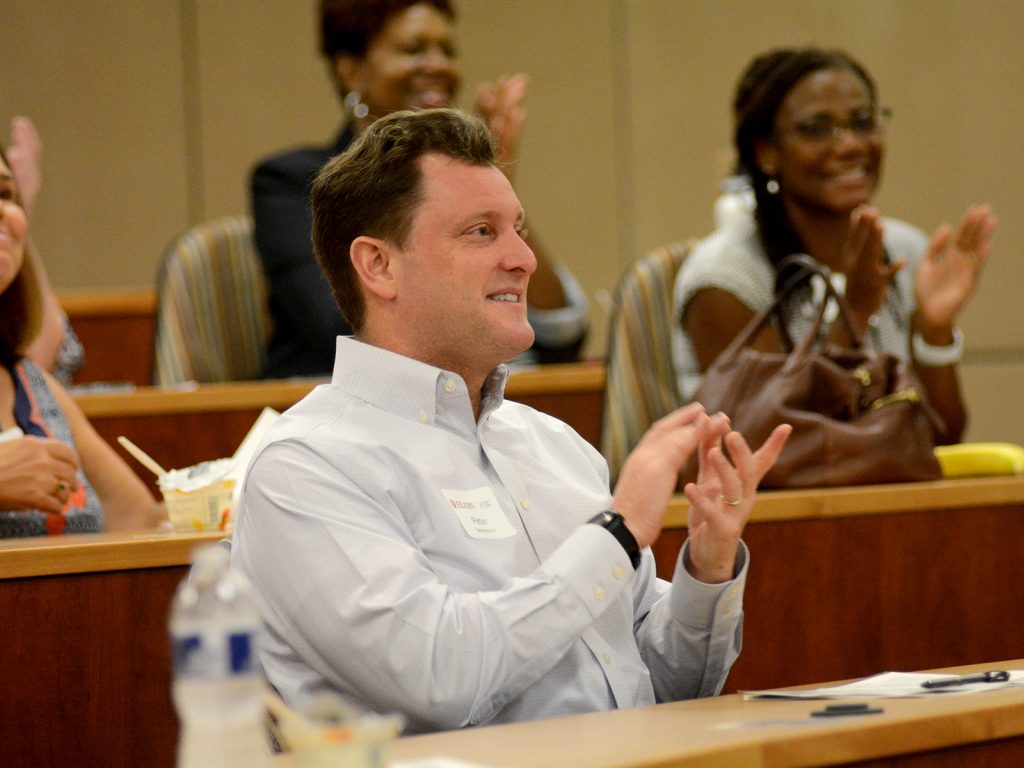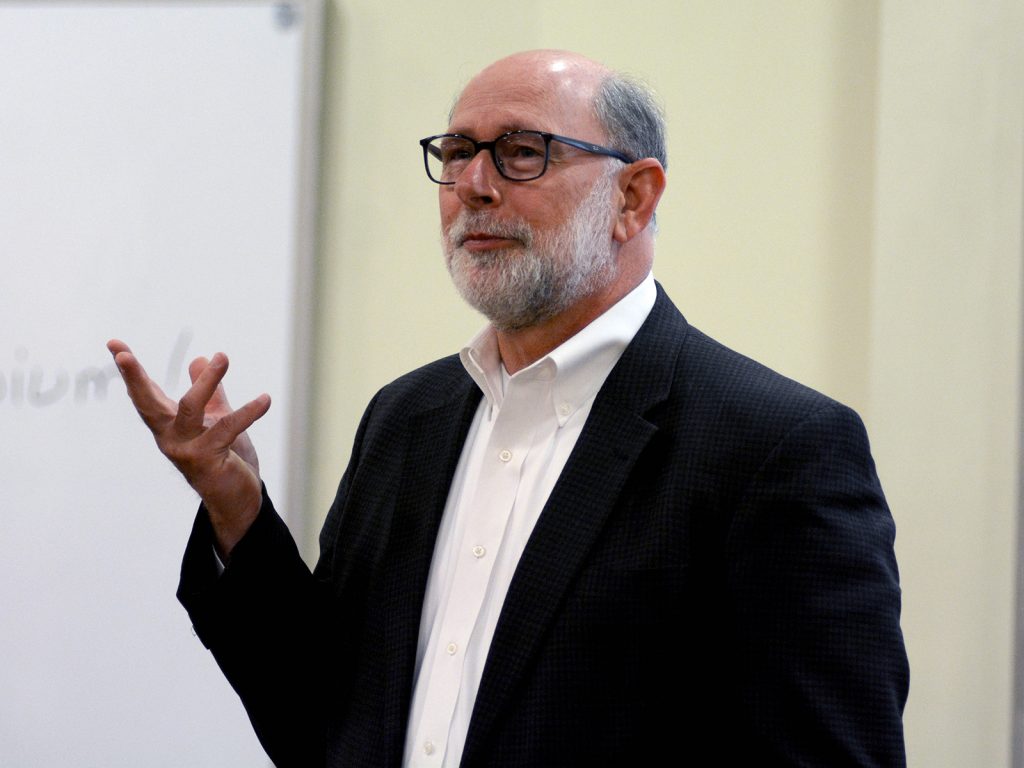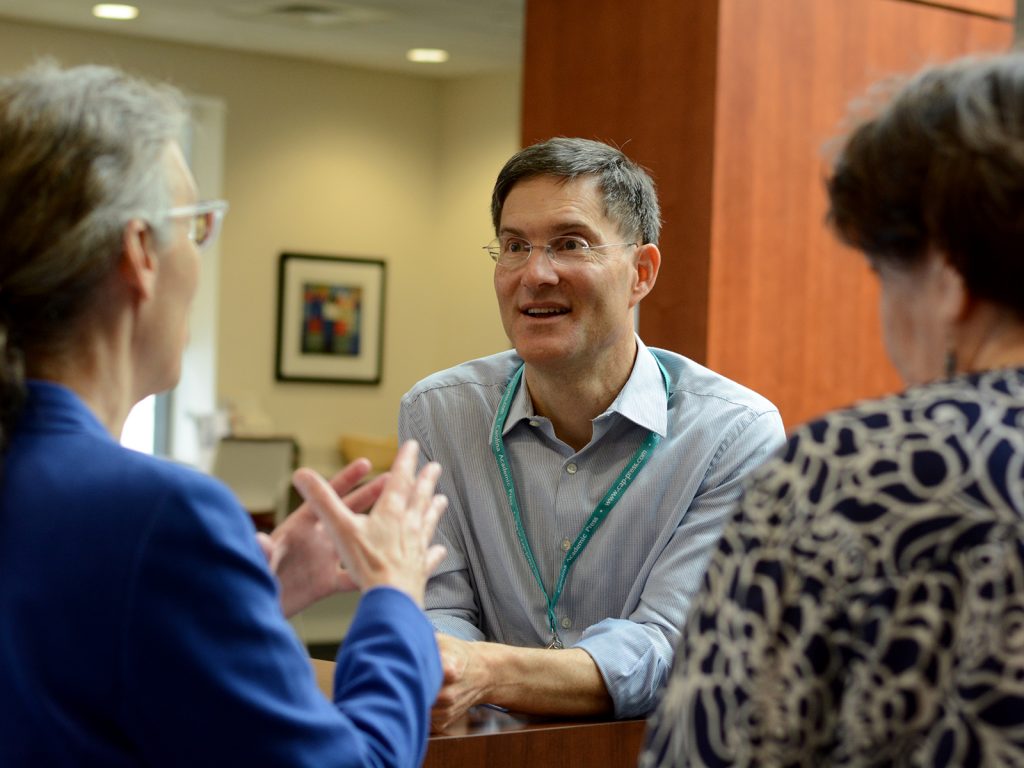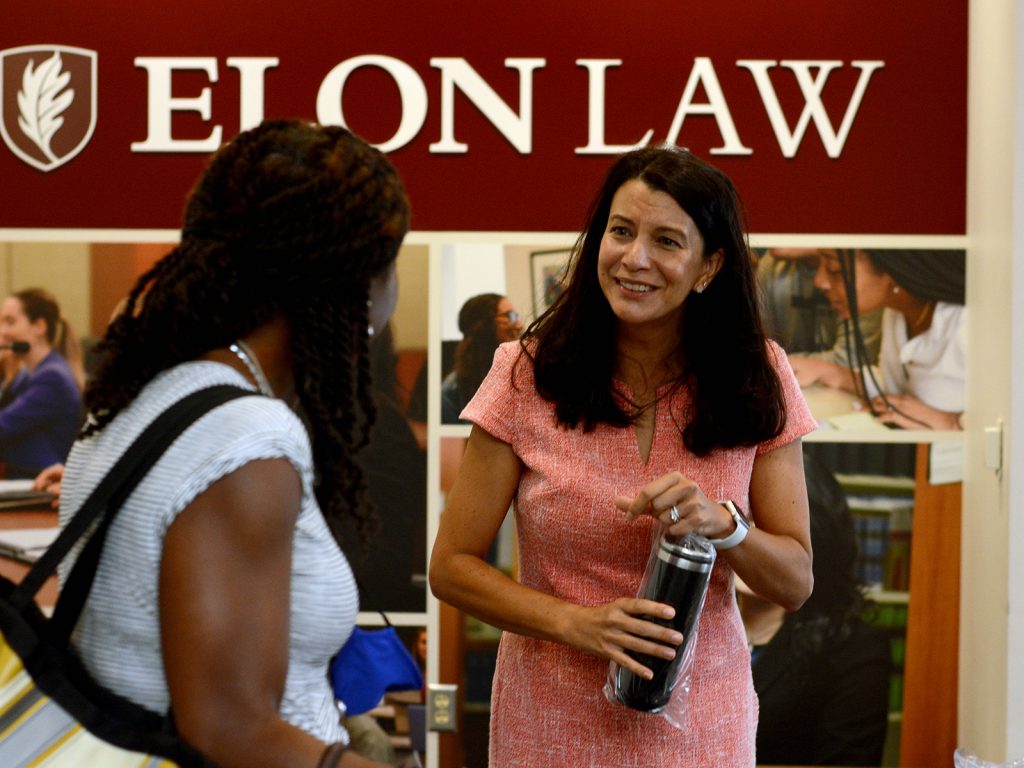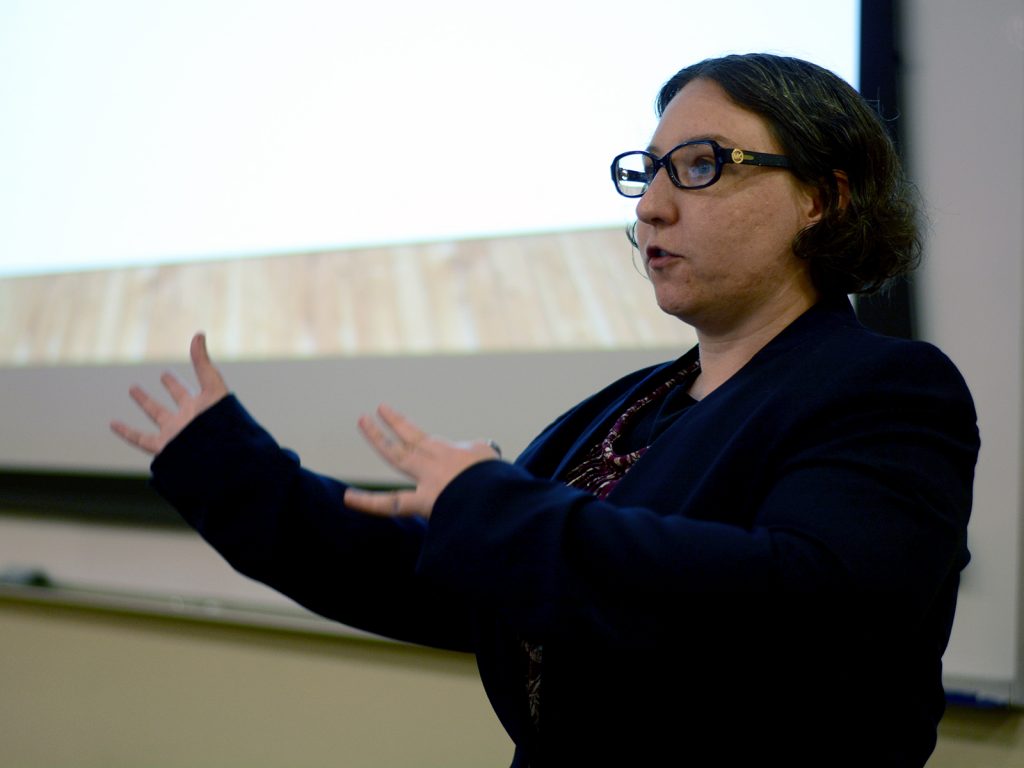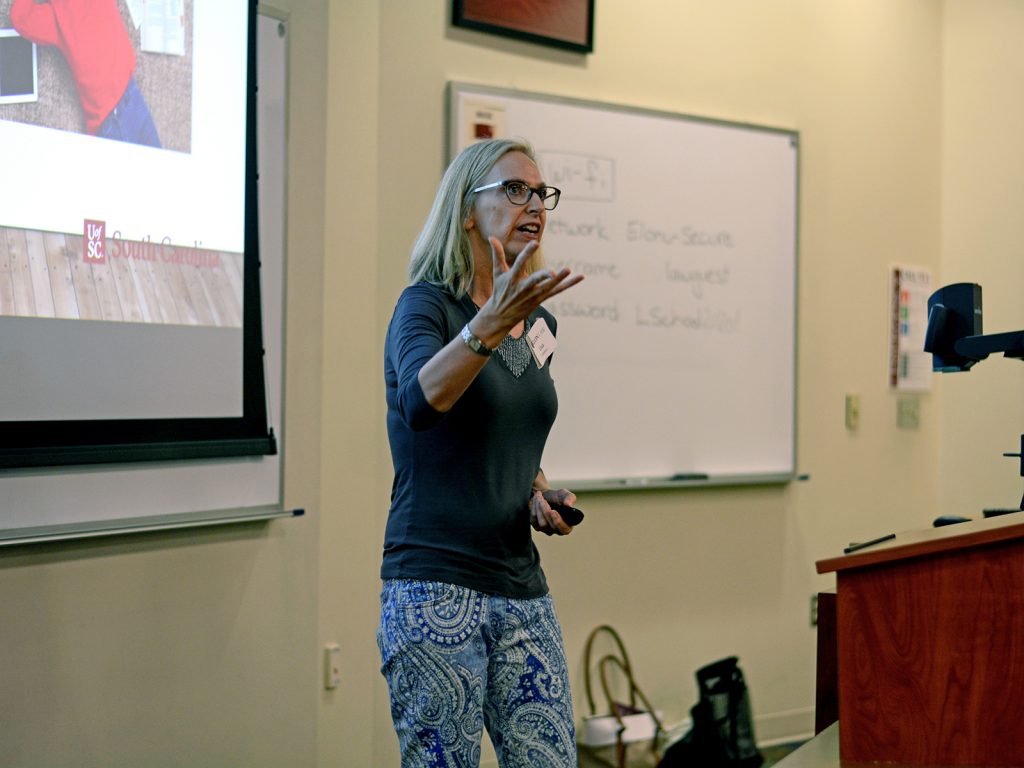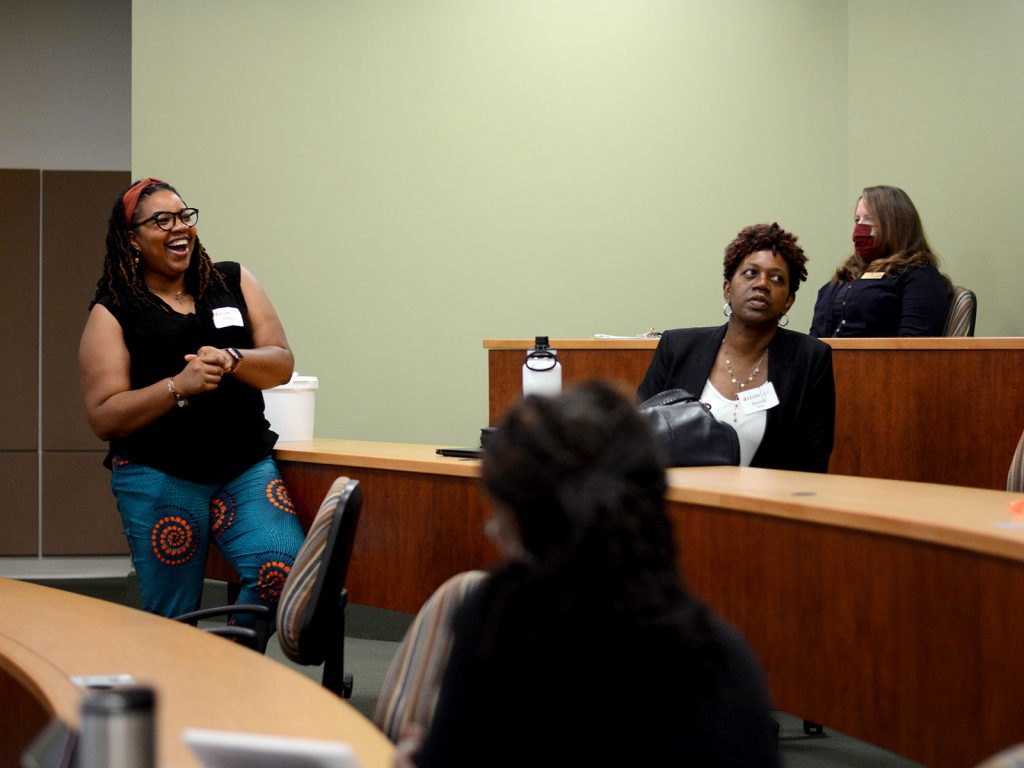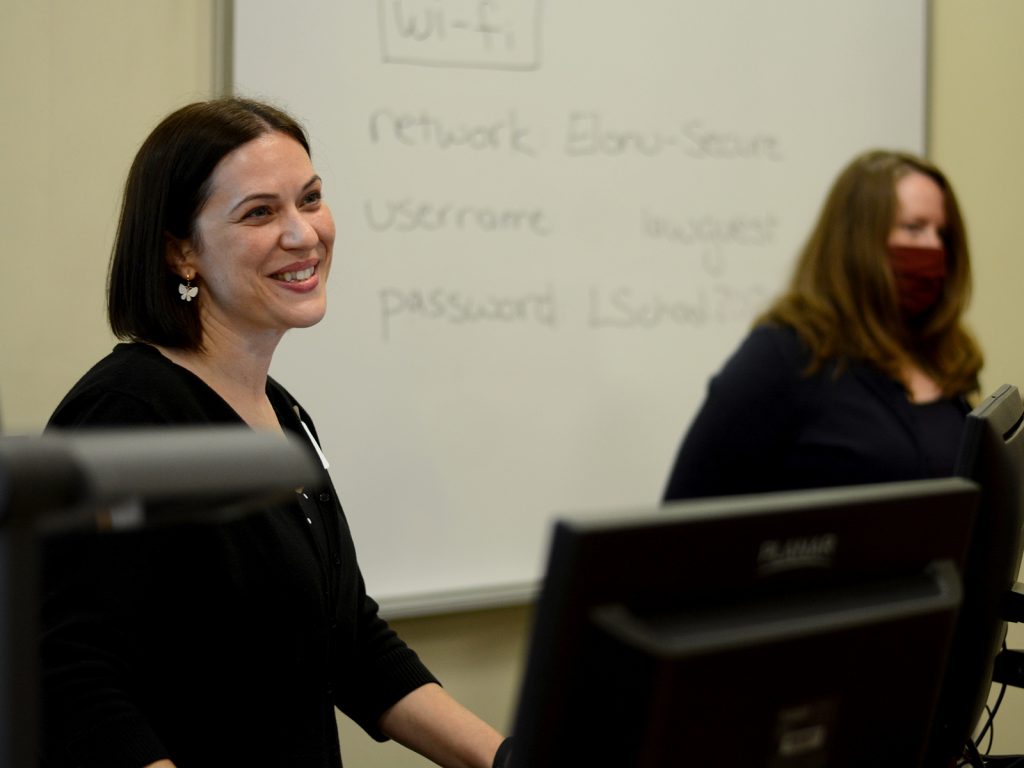Carolinas Colloquium at Elon Law – June 24, 2021
The North and South Carolina Legal Research and Writing Colloquium
The Carolinas Colloquium is a biennial event hosted on a rotating basis by law schools in North Carolina and South Carolina for legal research and legal writing faculty to exchange new ideas and best practices on teaching and scholarship. Elon University School of Law hosted the 2021 event in hybrid format. Nearly half of 60 registered participants attended in person in downtown Greensboro, North Carolina on June 24, with others joining via Zoom.
LexisNexis sponsored the daylong conference, which included refreshments and lunch, plus an optional tour afterward of the International Civil Rights Museum located three blocks from Elon Law. The colloquium featured presentations on topics that ranged from digital grading to seeking real-time formative assessments to teaching professionalism as a key element of legal communication.
Learn more about the conference with reflections from several presenters and attendees.
Presentations and Speaker Bios (in Chronological Order)
Brenda Gibson (Wake Forest): "What a Difference a Year Makes in the Life of a Legal Writing Professor"
To effectively teach our students skills that will benefit them as they move through law school and life, generally, we must first address how and why these skills have buoyed us as leaders, professors, and colleagues. To that end, this presentation discusses the flexibility (and perhaps other soft skills) that is needed in the midst of change – whether it is change in program structure, change in the school at which you teach, or change in the times (pandemic and social unrest) that we find ourselves in the midst of. Using a discussion/polling feature, this presentation engages the topic of multi-cultural and multi-generational approaches to addressing some of the issues I (and perhaps we all) faced in making decisions and embracing change.
About the Presenter
Brenda Gibson is an Associate Professor of Legal Writing, Analysis, and Research at Wake Forest University School of Law. Prior to that, she directed the Legal Writing Program at North Carolina Central University School of Law for almost 15 years. Gibson’s research focuses on the science of pedagogy and its intersections with social science, history, and the law. She is active in the legal writing community, having served in the Association of Legal Writing Directors in several capacities, including as an elected board member. She is also active in the Legal Writing Institute, where she has served as co-chair of the LWI Awards Committee and on the editorial boards of the LWI’s Monograph Series and Second Draft. Gibson currently is a member of the Association of American Law Schools-Legal Writing, Reasoning & Research Section’s Executive Committee.
Prior to her work in academia, Gibson was a staff attorney at the North Carolina Court of Appeals, Office of Staff Counsel. She was also a law clerk to Judge Clifton E. Johnson and Judge Patricia Timmons-Goodson at the Court of Appeals. In her free time, she likes to support those who are caring for elderly family members and mentor young people interested in the study of law.
Jeremy Mullem (Duke): "Lessons Learned from a Year of Digital Grading"
NOTE: Professor Jeremy Mullem’s presentation was not recorded.
For many educators (and their students) the sudden onset of the pandemic meant losing access to easy printing. As someone who had almost always graded hard copies of student work—even when that work was submitted electronically—Professor Jeremy Mullem of Duke Law’s transition to all-digital grading brought some useful lessons. Over 25 minutes, he shares some of those lessons, explains why he reverted back to grading hard copies this spring, and invites attendees to share their experiences during the past year (or from earlier) with completely digital grading.
About the Presenter
Jeremy Mullem is a Clinical Professor of Law and Director of Legal Writing at Duke Law School. He has been a member of Duke Law’s faculty since 2006. Before that, he taught legal research and writing at American University Washington College of Law.
Caroleen Dineen (Elon): "Developing Resiliency as a Practice Skill Through the Legal Writing Curriculum"
Legal writing professors understand the challenges of developing a legal writing curriculum that can provide sufficient education, training, and experience to develop the skills students need to become “practice ready” lawyers. The legal writing curriculum’s focus on practice skills development directly relates to a law school’ compliance with the American Bar Association’s experiential and other learning standards. This focus also addresses the needs of law students’ future employers – practitioners who identify legal research and writing as priority skills for new attorneys.
Research concerning both law students and lawyers indicates a lack of resiliency and a decline in psychological well-being within the profession. Inability to adapt to adversity and stress and to deal effectively with the stressors inherent in law school and legal practice can have significant personal and professional consequences. Depression, suicide, substance abuse, and other quality-of-life problems have been identified as issues for lawyers and law students. Lack of resiliency also can negatively impact a lawyer’s practice and result in professional discipline. Lack of resilience manifesting during the law school experience can impact law students’ potential for future practice or their ability to effectively practice as lawyers.
Lack of resiliency is not a problem specific to the legal profession. Other professional organizations and industries have recognized the importance of providing resiliency training for employees and members to promote individual professional development and organizational success. This presentation considers whether and how the legal writing curriculum provides components of resiliency training in first-year law students. The presentation also explores how evaluation of current teaching practices in legal writing and consideration of new techniques may promote resiliency among law students while maintaining the focus on practical skills development.
About the Presenter
Caroleen Dineen is an Assistant Professor at Elon University School of Law where she teaches Legal Method & Communication courses and serves as Interim Director of the Legal Method & Communication Program. Dineen previously directed the Legal Research and Writing Program at Florida Agricultural & Mechanical University College of Law. In addition to legal writing, Dineen has taught courses in Environmental Law, Legislation, Legislative Drafting, Policy and Advocacy Drafting, and Interviewing and Counseling. She also has served as faculty for the Environmental Cooperative Science Center, a multi-institution program funded by the National Oceanic and Atmospheric Administration to educate and support the research of multidisciplinary students training for careers in environmental, coastal, and marine sciences and policy.
Prior to teaching, Dineen’s legal practice focused on land, water, natural resources, and protected species regulation, permitting, and use. She served as a Senior Counsel for the State of Washington House of Representatives and practiced in both Washington and Florida representing clients in litigation and in administrative, regulatory, and legislative proceedings.
Kate Irwin-Smiler (Wake Forest) & Vanessa Zboreak (Elon): "Fifty-State Regulatory Research Design"
This presentation has its origins in a research project started several years ago in an attempt to locate and classify the various ways state administrative agencies use scientific studies and other data in their regulatory processes. Fifty-state research poses familiar challenges: states organize information differently, online resources vary, terminology may not be consistent, etc. When attempting to create a research plan for this project, presenters encountered additional challenges in state administrative law research. Some states set statutory standards that applied to all state agencies, some state legislatures directed individual agencies to develop internal standards, and a few states formed commissions to individually vet the studies and data used in every rule making. As a result, the initial research process was only partially successful, and challenging for research assistants to execute methodically. Because there are other scholarly opportunities in state regulatory research, presenters consider how best to design a research plan to answer similar questions of state administrative law.
About the Presenters
Vanessa Zboreak is an Assistant Professor of Law at Elon University School of Law. She teaches Legal Methods and Communication courses and Constitutional Law. She also advises the Elon Juris Doctor/Master of Environmental Law and Policy dual-degree program in law and environmental studies, in conjunction with Vermont Law School. Previously, Zboreak was a Professor of the Practice at Wake Forest University School of Law, teaching Legal Writing, Analysis, and Research as well as Administrative Law, Remedies, Food Law, Land Use, and other courses in the Juris Doctor, Master of Studies in Law, and Sustainability programs. Her research focuses on administrative rulemaking, particularly the public comment process and agency responses to citizen science and other external expertise. She is a commissioner on the North Carolina General Statutes Commission and sits on the board of Yadkin Riverkeeper.
John Korzen (Wake Forest): "Using a Filed NC Court of Appeals Brief to Teach Persuasive Writing"
Using a real 2019 filing in the North Carolina Court of Appeals, this presentation explains how a brief could be used with legal writing students learning persuasive during any year of law school. Because the brief involves injury from a foul ball at a baseball game, one proposed name for the segment could be “You Be The Ump.” Uses potentially include:
- Review of basic appellate formatting requirements (required sections such as tables, standard of review, etc.)
- Evaluate the optional Introduction section the writer included in terms of persuasiveness
- Evaluate the argument headings
- Evaluate the roadmap
- Evaluate notable stylistic elements, including vivid verbs, many short sentences (3-5 words long), use of sentence fragments, and sentences starting with conjunctions such as “and” or “but”
About the Presenter
John Korzen is Director of the Appellate Advocacy Clinic and an Associate Professor of Legal Writing at Wake Forest University School of Law, where he has been on the faculty since 2003. A proud “Double Deac,” Korzen graduated cum laude from Wake Forest with Bachelor of Arts and, later, cum laude with a Juris Doctor. Between college and law school he taught in the Winston-Salem/Forsyth County public schools for six years. After law school, he clerked for the late Sam J. Ervin III, then Chief Judge of the Fourth Circuit, and then practiced for a total of 11 years at two private law firms.
Since 2007, he has supervised more than 40 oral arguments by 3Ls in his clinic various appellate courts and coached more than 80 students in numerous moot court competitions. Teams he coached won the City Bar of New York National Moot Court Competition national championship in 2017 and reached the semi-finals in 2015 (out of more than 180 teams). He is certified as a specialist in Appellate Practice by the North Carolina State Bar Board of Legal Specialization. He argued a case in the Supreme Court of the United States in 2014. Since 2019 he has been Chair of the North Carolina General Statutes Commission.
Pete Nemerovski (UNC): "Assessing Research in the First Year"
This presentation focuses on how to assess and evaluate students’ research skills during their first year of law school. At UNC, students complete a graded Federal-Law Research Project during the spring semester of their first year. The FLRP requires students to research an issue of federal law and report their results, which typically include statutes, regulations, and cases. In this presentation, I discuss the history and goals of the FLRP and explain how it works. I also summarize the literature on assessing research and try to identify some best practices when assessing research.
About the Presenter
Pete Nemerovski is a Clinical Associate Professor at the University of North Carolina School of Law. He teaches Research, Reasoning, Writing, and Advocacy I and II and Writing for the Bar, and will teach Writing for Practice next year. Prior to joining the UNC Law faculty in 2017, he taught legal writing at the University of Miami School of Law for seven years. He practiced law with large firms in Los Angeles and Miami from 2003 to 2010.
Daniel Brackmann (South Carolina): "The Three-Minute Essay: Getting Real-Time Formative Assessments"
A perennial issue with most forms of assessment is that they occur at some time after the class is taught. Likewise, comments received in course evaluations, while they can be instructive for the next time a class is taught, do not lend themselves to actionable information for the class being taught in the present. Thus, as is often the case, when a student expresses confusion or offers a sound suggestion in an evaluation, it is too late to do anything with it in the instant class.
Using the Three-Minute Essay technique is a short, easy way to evoke student cognition about the day’s lesson and simultaneously collect instant, actionable feedback from students that can be incorporated in the very next class. A three-minute essay both asks the students to reflect on the class they just finished, on connections they can make or questions they still might have, and also invites them to communicate with the instructor about how the class is going. Three-minute essays are short, only a few sentences long, and easy to complete. However, if well-crafted they ask students to reflect on the class material and synthesize information while providing the instructor with valuable feedback.
About the Presenter
Dan Brackmann has been a Reference Librarian at the University of South Carolina since 2017 where he also teaches legal research classes in the 1L curriculum. From 2014-2017, Brackmann was the Electronic Resources Librarian at Texas Southern University’s Thurgood Marshall School of Law. He practiced law for fifteen years in the St. Louis area and has a Master of Science in Library and Information Science from the University of Illinois, a Juris Doctor from the University of Cincinnati, and a Bachelor of Arts from Gustavus Adolphus College. Brackmann is currently a member of American Association of Law Libraries, Southeast Association for Language Learning, the Missouri Bar, and the Illinois Bar.
Marva Woods, Shanda Lewis & Laura Glover (Sponsor's Session): LexisNexis Update
This presentation includes a look at current Lexis integration statistics in the commercial market and a quick overview of the key factors to know about commercial subscriptions. Presenters also discuss the different Lexis teaching tools available to legal research and writing professors and highlight a few recent enhancements to the Lexis+ research system.
Vanessa Zboreak (Elon): "The Systems Classroom: Challenging Our Mental Models"
As we look back on a year of teaching under unusual and ever-changing circumstances, we have a unique opportunity to test our assumptions about what a classroom requires, and what it desires. Many of us had to change our classroom policies and teaching approaches in small and large ways, either by choice or by necessity. In response, how did our classroom dynamics shift, or not? Using systems thinking principles as a frame, this presentation examines how we can rethink our beliefs about best practices in the classroom, in light of what we’ve learned this year. The presentation first gives an overview of methods of questioning mental models employed in systems thinking, and then asks participants to walk through a guided set of questions. This activity is designed to help us evaluate the “why” behind our policies and identify possible alternative approaches to achieve our core goals for our classrooms.
About the Presenter
Vanessa Zboreak is an Assistant Professor of Law at Elon University School of Law. She teaches Legal Methods and Communication courses and Constitutional Law. She also advises the Elon Juris Doctor/Master of Environmental Law and Policy dual-degree program in law and environmental studies, in conjunction with Vermont Law School. Previously, Zboreak was a Professor of the Practice at Wake Forest University School of Law, teaching Legal Writing, Analysis, and Research as well as Administrative Law, Remedies, Food Law, Land Use, and other courses in the Juris Doctor, Master of Studies in Law, and Sustainability programs. Her research focuses on administrative rulemaking, particularly the public comment process and agency responses to citizen science and other external expertise. She is a commissioner on the North Carolina General Statutes Commission and sits on the board of Yadkin Riverkeeper.
Nichelle Perry, Richelle Reid, Zanada Joyner, Matthew Neely & Emily Hoffman (N.C. Central): "Teaching with Teams to Teach Legal Research"
Microsoft Teams has been described as a collaborative workspace within Microsoft 365/Office 365 that acts as a central hub for workplace conversations, collaborative teamwork, video chats and document sharing. Most academic campuses have access to Microsoft Teams. During this presentation, a team led by Nichelle Perry from N.C. Central University School of Law briefly shares how it utilized some of the features of Teams to effectively coordinate teaching legal research. Major features discussed include chat, file sharing, calls and meetings, and the Microsoft Teams mobile app.
About the Presenters
Emily Hoffman received her Juris Doctorate and Master of Library Science degree in the NCCU Joint Degree Program in 2019. Following graduation, she worked in document review and privacy before returning to the nest in November 2020 as a Reference Librarian. Additionally, Hoffman volunteers with various non-profit organizations and is a member of AALL and SEALL. Outside of the library, she unwinds by spending time with her pets, reading, or out in nature.
Zanada Joyner currently serves as the NCCU Library’s Senior Reference Librarian. Prior to this position, she served as the Digital Services and Faculty Services Librarian at NCCU. Before joining NCCU, she was the Research and Instructional Services Librarian at the Alexander Campbell King Law Library at the University of Georgia Law Library. While completing her Master of Library and Information Science degree, Joyner worked as a Reference Associate at Loyola University New Orleans, College of Law Library. Additionally, she served as a judicial law clerk for New Jersey Superior Court Judge Thomas S. Smith, Jr. (retired).
Matthew Neely joined the North Carolina Central University School of Law Library in 2018 as the Library’s Digital Services Librarian. Neely received his Master of Library and Information Science from the University of Washington and his Juris Doctor from the Cumberland School of Law at Samford University, where he also received his Master of Divinity from Samford’s Beeson Divinity School. Neely earned his Bachelor of Science in Political Science from Western Carolina University in 2010.
Nichelle “Nikki” Perry received her Master of Library Science and Juris Doctor degrees from North Carolina Central University. She currently serves as an Assistant Professor and the Director of the Library at North Carolina Central University School of Law. Prior to becoming director, she served as the Assistant Director and the Reference Instructional Librarian at NCCU and the Reference/Electronic Services Librarian at the Kathrine R. Everett Law Library at the University of North Carolina at Chapel Hill. Additionally, she served as a judicial law clerk for North Carolina Court of Appeals judge Clifton E. Johnson. She has served on several regional and national library committees.
Richelle Reid joined the North Carolina Central University School of Law Library in 2020 as the Assistant Law Library Director. Prior to coming to North Carolina Central, Reid worked nearly 10 years at the Hugh F. MacMillan Law Library at Emory University School of Law as a Law Librarian for Research Services and Adjunct Professor teaching advanced legal research courses. She also served as the Student Services and User Experience Librarian where she coordinated marketing and outreach events, including the library’s award-winning exam break activities. Additionally, she worked at Emory as a law library intern while completing her Master in Library and Information Science degree.
Katie Brown, Leo Brown, Jennifer North, Deborah Turkewitz & David Estes (Charleston): "An Augmented Approach to Legal Writing: Cross-Departmental Instruction for a Holistic Student Experience"
In Fall 2019, the Charleston School of Law’s legal writing instructors and law librarians instituted a team-teaching model for the 1L legal research and writing class. Building on experience, we sought to create a dynamic, cross-departmental teaching team to create a more holistic student experience. Our panel, comprised of a legal writing instructor, law librarian, composition specialist, and a student LRAW fellow, addresses challenges of coordinating weekly subject content for a 14-week course across three different departments, preparation of assignments, the Bluebook, and creating class presentation content. We also discuss modifications made to the course necessitated by COVID-19.
About the Presenters
Kathleen Brown is the Associate Dean for Information Resources at Charleston School of Law. Brown’s research and scholarship interests are in intellectual property, acting skills for lawyers, legal technology, management, and various legal research-related topics. She has taught specialized, beginner, and advanced legal research courses and seminars on Legal Technology for Practice, Art of Advocacy, and Contracts. She is a very active member of the American Association of Law Libraries. Brown has participated in a variety of leadership roles throughout the Association chapters and special interest sections. Brown earned her B.F.A. degree from DePaul University, her Master’s degree in Library and Information Science from the Drexel University iSchool, and her J.D. degree from Seattle University School of Law.
Leo Brown has been the Composition Specialist in the Academic Success and Bar Prep Department at Charleston School of Law since January 2017. He teaches the Upper-Level Writing Workshop and classes with Legal Research, Analysis, and Writing; Legal Skills; and the Externship Program. Prior to joining Charleston School of Law, he taught undergraduate and graduate-level writing, English as a Second Language classes, English as a Foreign Language classes, and in university writing centers.
David Estes is a rising 3L at Charleston School of Law. Estes served as a Legal Research, Analysis, and Writing Program student teaching fellow during the 2020-21 academic year. He currently serves as president of Trial Advocacy Board and Student Works Editor of Charleston Law Review. Following graduation, Estes plans to pursue a career in sports law.
Jay Paskan joined Charleston School of Law in August 2017 and teaches Legal Research, Analysis, and Writing; Legal Skills; and Litigating a Transaction. Prior to joining the law school, Paskan worked as a medical malpractice defense attorney at the trial and appellate levels, during the course of which he wrote briefs as counsel of record and as amicus counsel that were filed with the Supreme Court of Ohio. While practicing, he earned yearly honors as an Ohio Super Lawyer Rising Star. He is licensed in Ohio, the Northern District of Ohio, and Sixth Circuit Court of Appeals.
Deborah Turkewitz has been the Faculty Services, Student Publications, and Reference Librarian at the Charleston School of Law since August 2018. She teaches the Research component of the Legal Research and Analysis Writing program and Advanced Legal Research. Turkewitz is the co-editor of the Southeastern chapter, American Association of Law Libraries regional newsletter. She received her Master of Library and Information Science from the University of South Carolina, her Juris Doctor from the University at Buffalo School of Law, and her Bachelor of Arts in Political Science from the State University of New York College at Geneseo.
Katie Lynch (Elon): "Surviving Your First Year Teaching Legal Research, in a Pandemic Year"
During your first year of teaching, you are going to have some expectations. The students can see that you are green a mile away. You need to prep for weekly assignments, grade the assignments, and make sure you are available to students. Make sure your lessons actually make sense to your students. Then, the state shuts down because of a pandemic and now you have to scramble. Instead of teaching one class, you are teaching two because of COVID room restrictions. You cannot do group work assignments because you need students to stay 6 feet apart. In this presentation, I talk about my experiences teaching “Introductory to Legal Research” – what worked, what did not work, what I would change for the following year.
About the Presenter
Kathleen “Katie” Lynch (she/her) is a 2017 alumna of Elon University School of Law. She received her MILS from the University of Arizona in 2018. Lynch is a native New Yorker and received her undergraduate degree from John Jay College of Criminal Justice. In her free time, she enjoys playing with her cats and debating the finer points of the Prime Directive.
Kaci Bishop & Alexa Chew (UNC): "Teaching the Turducken™ of Legal Writing: Demonstrating the Layers of the Multi-State Performance Test"
Sitting down to take the Multi-state Performance Test (MPT) is a little like sitting down to eat a Turducken: one thing is stuffed inside another thing and appreciating each layer is important to the whole experience. At one layer, the MPT is merely an everyday chicken aimed at testing one’s ability to perform essential lawyering skills, including crucial legal writing skills, that a new practicing attorney should be able to perform. Other layers of the MPT, like strict time constraints, compromise and subvert the very essential lawyering and legal writing skills the MPT is designed to test. This presentation engages participants in a discussion and in-class exercise about how understanding these layers of the MPT can help us better teach the MPT and help students both succeed on the bar exam and hone their legal writing and lawyering skills.
About the Presenters
Kaci Bishop is a Clinical Professor of Law at the University of North Carolina School of Law. She directs and teaches the Immigration Clinic, which provides direct assistance to asylum seekers and to survivors of domestic or sexual violence, human trafficking, or other crimes. She also teaches Writing for the Bar, an upper-level legal writing course, and assists with the school’s academic success programs. Additionally, she taught Research, Reasoning, Writing, and Advocacy I and II for many years and co-developed and piloted the Transition to the Profession course as part of the first-year curriculum. Among other works, she is the author of “Framing Failure in the Legal Classroom: Techniques for Encouraging Growth and Resiliency.” Her scholarly interests include experiential and legal pedagogy, academic excellence, and humanitarian immigration law.
Alexa Chew is a Clinical Professor of Law at the University of North Carolina School of Law where she teaches Research, Reasoning, Writing, and Advocacy I and II; Foundations in U.S. Common Law; and Writing for Practice. She is the author of two textbooks: “The Complete Legal Writer” and “The Complete Bar Writer” (with Katie Rose Guest Pryal). She also has authored, among other articles, three articles about legal citation: “Citation Literacy,” “Stylish Legal Citation,” and “Citation Stickiness” (with Kevin Bennardo). In 2015, UNC Law awarded her the Robert G. Byrd Award for Excellence and Creativity in Teaching. And in 2017, UNC Law awarded her the Charles E. Daye Award for Excellence in Faculty Service.
Lisa Eichhorn (South Carolina): "Teaching Grammar & Punctuation: Something That Works Reasonably Well"
This session presents some techniques that have worked reasonably well to ensure that most of the students in an upper-level legal writing course learn to avoid the grammar and punctuation errors that will most interfere with their ability to get their thoughts across precisely and coherently in writing. These are also, often, the errors that will make them look terrible in practice.
About the Presenter
Lisa Eichhorn has been teaching legal writing to people in various contexts since the dawn of time, or thereabouts, first at West Virginia University, then at the University of Denver, and, since 2000, at the University of South Carolina. She also teaches Assistant U.S. Attorneys regularly at the U.S. Department of Justice’s National Advocacy Center. She is a Professor of Law and, nominally, the Director of Legal Writing at the University of South Carolina School of Law, but the fabulous folks who teach first-year legal writing (Jan Baker, Shelby Leonardi, Ami Leventis, Amy Milligan, and Michael Virzi) have long passed the point of needing direction. Eichhorn finds it hard to walk past a dog without offering a scratch on the chest and some words of encouragement.
Craig Smith (UNC): "'2020 Vision': What Did 2020 and Early 2021 Teach Us About Teaching Professionalism as a Key Element of Legal Communication?"
To teach effective legal communication is, in part, to teach professionalism. Particularly since 2020, professionalism has been evolving alongside intense political and social polarization, public-health crises, policing controversies, and deeper conversations about diversity, equity, inclusion, and belonging. Let’s collectively discuss what have we learned recently—or perhaps unlearned—about teaching professionalism in the context of legal research and writing instruction.
About the Presenter
Craig T. Smith is a Clinical Professor and Assistant Dean for the Writing and Learning Resources Center, which has nine faculty members who teach in a first-year research and writing program, related upper-level experiential courses, and an academic excellence program. On July 1 he will begin as the school’s Associate Dean for Academic Affairs. Smith has served as a board member and president of the Association of Legal Writing Directors, as a member of the editorial boards of the Legal Writing: The Journal of the Legal Writing Institute and of Perspectives: Teaching Legal Research and Writing, and as a presenter at the Association of American Law Schools Workshop for Beginning Legal Writing Teachers. For the American Bar Association, he has participated in and chaired accreditation site-evaluation teams and served on committees of the Section on Legal Education and Admissions to the Bar.
Amanda Elyse (Seattle): "Why Legal Writing Professors Should Teach Singular 'They' Pronouns - and How to Do So"
This presentation covers why legal writing professors should teach the use of singular “they/them/theirs” pronouns based on three primary reasons: 1) language is evolving to be inclusive of singular “they”; 2) the legal system is adapting to be inclusive of singular “they” pronouns; and 3) our world demands it. Additionally, this presentation covers how legal writing professors can teach singular “they” pronouns through memo and brief problems that include a character whose pronouns are they/them/theirs, a context that gives students a chance to practice the pronouns as correct grammar and as identity-affirming language and that also allows for class discussion about the related social issues in the legal system and beyond.
About the Presenter
Amanda Elyse (she/her/hers) is a Visiting Assistant Professor at Seattle University School of Law, where she teaches in the Legal Writing Program. Elyse came to her career in the legal profession from a mixed background of writing and being an organizer in grassroots social justice movements, and she now works to combine those passions in the classroom to create a dynamic learning experience that meets the needs and interests of her students in an ever-changing legal landscape.
Shelly Bibb DeAdder (N.C. Central): "Tech Tools That Are Here to Stay: Kaizena and Padlet"
During the COVID-19 pandemic, legal writing professors were forced to adapt to remote teaching/learning. For most of us, the summer of 2020 was consumed with trainings and research on tech tools to enhance student learning in a remote environment. As we head back to an in-person format, some of those tech tools will remain effective. Kaizena allows professors to provide oral feedback on student work in addition to the traditional track changes and written feedback. Providing oral feedback is efficient and allows the students to hear a friendly tone. Additionally, audio learners benefit from hearing feedback on core concepts. Padlet is a virtual cork board that can be used for taking attendance, brainstorming, and creating procedural timelines. Unlike a dry erase board that is typically wiped clean at the end of class, Padlet posts can be saved to your computer. While professors and students are eager to return to a physical classroom, we do not have to abandon all we learned from navigating the virtual world. Kaizena and Padlet are two tech tools that are here to stay.
About the Presenter
Shelly Bibb DeAdder is an Associate Professor of Legal Writing at her alma mater, North Carolina Central University. She began teaching at North Carolina Central University as an adjunct in 2012 and joined the faculty full-time in 2014. She currently serves as Coordinator of the 1L Legal Writing Program. In addition to 1L classes, she also teaches Appellate Advocacy, Judicial Opinion Writing, and Senior Writing. DeAdder is a member of the Appellate Defender Roster, representing indigent clients on appeal after a criminal conviction. Outside of the classroom, she enjoys wrangling her six-year-old daughter and eight-year-old “puppy.”
